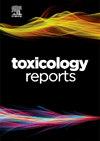Methionine mitigates aflatoxicosis in quail chicks by improving gut microbiota, immunity, and meat quality
Q1 Environmental Science
引用次数: 0
Abstract
This study aimed to investigate the effects of dietary methionine (Met) supplementation on performance, immunity, and meat quality in growing Japanese quail exposed to aflatoxin B1 (AFB1)-contaminated diets. Nine experimental diets were formulated, incorporating three levels of dietary Met (5.0, 6.0, and 7.0 g/kg) and three levels of AFB1 (0.0, 2.5, and 5.0 mg/kg) in a completely randomized design and fed from d 8 post-hatch to d 35 of age. The results revealed that increasing dietary Met levels significantly improved body weight gain (BWG; P < 0.001), feed conversion ratio (FCR; P < 0.001), and feed intake (FI; P < 0.001), while counteracting the negative effects of AFB1 on these performance parameters. Dietary Met supplementation also exerted a protective effect against elevated hepatic enzyme levels (AST, P < 0.001; ALT, P < 0.001; ALP, P = 0.001; and LDH, P < 0.001) and serum uric acid levels (P < 0.001) induced by AFB1. Furthermore, dietary Met enhanced humoral immunity responses by increasing antibody production against sheep red blood cell antigen (P < 0.001) and hemagglutination inhibition response (P < 0.001), mitigating the AFB1-induced immune impairment. Meat quality parameters, including pH (P = 0.04), drip loss (P < 0.001), and malondialdehyde concentration (P < 0.001), were significantly influenced by the interaction between dietary Met and AFB1. Lastly, dietary Met supplementation effectively counteracted AFB1's detrimental effects on ileal lactic acid bacteria populations (P < 0.001). In conclusion, dietary Met supplementation shows promise as a nutritional intervention to alleviate the harmful effects of AFB1 exposure in Japanese quail, particularly in improving food quality and overall health.
蛋氨酸通过改善肠道微生物群、免疫力和肉质来减轻鹌鹑雏鸟黄曲霉中毒。
本试验旨在研究饲粮中添加蛋氨酸(Met)对黄曲霉毒素B1 (AFB1)污染日粮生长期日本鹌鹑生产性能、免疫力和肉品质的影响。采用完全随机设计,配制3个蛋氨酸水平(5.0、6.0和7.0 g/kg)和3个AFB1水平(0.0、2.5和5.0 mg/kg)的9种试验饲粮,从孵化后8日龄饲喂至35日龄。结果表明,饲粮中蛋氨酸水平的提高显著提高了体重增加(BWG;P 1对这些性能参数的影响。饲粮补充蛋氨酸也对肝酶水平升高(AST, P 1)具有保护作用。此外,饲粮中蛋氨酸通过增加抗绵羊红细胞抗原(P 1)诱导的免疫损伤的抗体产生来增强体液免疫应答。肉质参数包括pH (P = 0.04)、滴漏损失(P 1)和丙二醛浓度(P 1)。最后,饲粮中补充蛋氨酸可有效抵消AFB1对日本鹌鹑回肠乳酸菌种群(P 1)暴露的有害影响,特别是在改善食品质量和整体健康方面。
本文章由计算机程序翻译,如有差异,请以英文原文为准。
求助全文
约1分钟内获得全文
求助全文
来源期刊

Toxicology Reports
Environmental Science-Health, Toxicology and Mutagenesis
CiteScore
7.60
自引率
0.00%
发文量
228
审稿时长
11 weeks
 求助内容:
求助内容: 应助结果提醒方式:
应助结果提醒方式:


